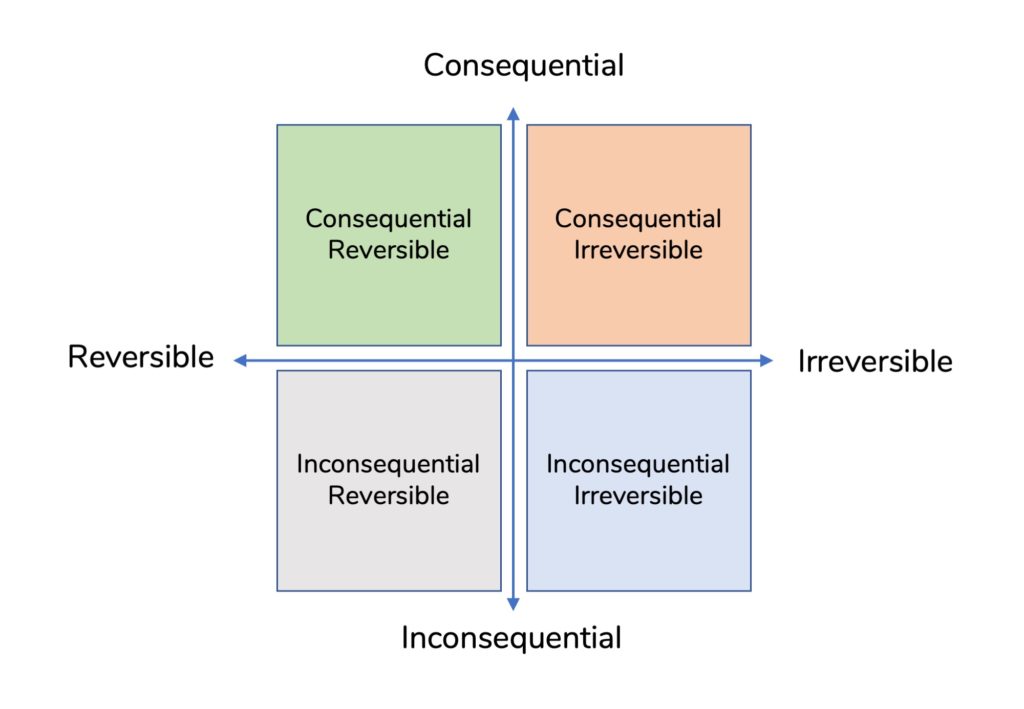You can tell how good someone is at making decisions by how much time they have.
Busy people spend a lot of time correcting poor decisions, so they don’t have time to make good decisions.
The problem is that making good decisions requires good thinking, and good thinking requires time, which many people don’t seem to have.
So how do we solve this dilemma?
A solution is to use the Decision-Matrix.
We make decisions every day, all the time—simple decisions, complicated decisions, and sometimes even life changing decisions.
- Who should we hire for the new position we created?
- Should we move to a new office location?
- Should we stop this product or service?
- How should we deal with low morale in team X?
Making good decisions takes time. Time many of us don’t seem to have anymore.
Ironically, people who make good decisions have more time, and those who make poor decisions have less time because they need to spend time and energy dealing with the consequences of their poor decisions.
What to do about it?
First, it is essential to realise that not all decisions merit the same amount of thinking effort.
Management teams often get bogged down in slow and ineffective decision-making when they fail to distinguish between consequential and inconsequential decisions.
There are four types of decisions we need to make on any given day. Let me illustrate this with a simple diagram.

- Type 1: Consequential and irreversible
- Type 2: Consequential but reversible
- Type 3: Inconsequential but irreversible
- Type 4: Inconsequential and reversible
Slow and deliberate decision-making is only required for Type 1 decisions because they are consequential and irreversible.
This matrix can become a powerful ally to help business leaders save time and ensure that they are not bogged down in decisions where they are not the best person to decide.
For instance, reversible decisions don’t need to be made the same way as irreversible decisions.
Reversible decisions can be made faster and without obsessing over finding complete information. That does not mean that you should be reckless. For reversible but consequential decisions, the best strategy is to run experiments.
Both types of inconsequential decisions should be delegated as much as possible. They are the perfect training ground to develop judgment.
This can save leaders a ton of time.
Does it work?
One leader who uses this matrix reports:
Delegating inconsequential decisions saved me a ton of time. Before this, people would come to me with relatively easy decisions to make, with fairly predictable results. The problem wasn’t making the decision—that took seconds in most cases. The problem was the 30 minutes the person spent presenting the decision to me. I saved at least 5–7 hours a week by implementing this one change.
I invested some of that time meeting with the people making these decisions once a week. I wanted to know what types of decisions they made, how they thought about them, and how the results were going. We also tracked old decisions so they could see their judgment improving (or not).
While the total volume of decisions we made as a team didn’t change, how they were allocated within the team changed. I estimate that I was personally making 75% fewer decisions. But the real kicker was that the quality of all the decisions we made improved dramatically. People started feeling connected to their work again, productivity improved, and sick days (a proxy for how engaged people were) dropped.
If you find yourself without enough time for the critical decisions, try using the matrix I presented in this post.
Now what?
If you want to explore how this would work in your organisation, just book a free one-hour strategy session.I have one or two open slots per week.
In the meantime, take care, stay safe, and get meaningful work done.
Are you a business founder with 10 to 50 employees?
Do you want to avoid becoming a bottleneck fror the growth of your business?
Apply for a free strategy call